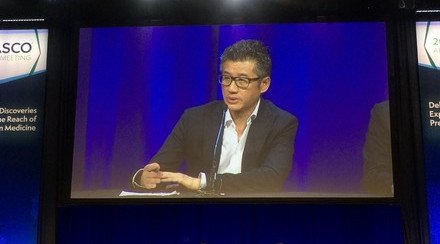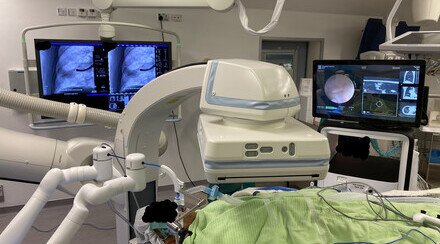CUHK co-leads global lung cancer study Supporting lorlatinib as first-line treatment option for ALK-positive advanced NSCLC patients
Professor Tony Mok Shu-kam from The Chinese University of Hong Kong (CUHK)’s Faculty of Medicine (CU Medicine) and several other international lung cancer experts joined forces to co-lead a Phase III trial for patients with anaplastic lymphoma kinase (ALK)-positive advanced non-small-cell lung cancer (NSCLC). The trial proved that the third-generation ALK-inhibitor lorlatinib has great potential as the first-line treatment in these patients, with or without brain metastases. Data showed the medicine improved progression-free survival and reduced central nervous system progression versus crizotinib, the first-generation targeted therapy. More importantly, half of all central nervous system adverse events were resolved without intervention or with lorlatinib dose modification. Findings of the study were published in the leading international medical journal Journal of Clinical Oncology.
Brain metastases develop in more than half of ALK-positive NSCLC patients
Lung cancer is the second most common cancer worldwide, accounting for 1.8 million deaths every year. It is also the leading cause of cancer deaths in Hong Kong, with more than 4,000 new cases every year. Of these, close to 80% suffer from NSCLC and about 5% of these cases are ALK-positive. It is common for lung cancer to spread to the brain, with the risk highest for NSCLC with epidermal growth factor receptor (EGFR) mutation or ALK rearrangement; more than half of these patients will develop brain metastases over the course of their disease.
Lorlatinib significantly improved progression-free survival and reduced central nervous system progression versus crizotinib
The research was a randomised, multicentre, open-label, active-controlled trial conducted in 296 patients with ALK-positive locally advanced or metastatic NSCLC who had not received prior systemic therapy for metastatic disease. Patients were randomly and evenly assigned to either oral lorlatinib 100mg once daily or oral crizotinib 250mg twice daily. They received tumour assessments, including magnetic resonance imaging, at eight-week intervals, and regular assessments of patient-reported outcomes.
Results showed that lorlatinib outperformed crizotinib in managing both cancer progression and intracranial activity. The rate of 12-month progression-free survival increased with lorlatinib versus crizotinib in patients with or without brain metastases at baseline (please refer to table 1 for full data). Also, lorlatinib significantly reduced central nervous system progression (please refer to table 2 for full data). Half of central nervous system adverse events were resolved without intervention or with lorlatinib dose modification.
Table 1: An overview of the 12-month progression-free survival outcomes in patients with or without brain metastases
| Lorlatinib | Crizotinib |
|---|---|---|
Patients with brain metastases | 78% | 22% |
Patients without brain metastases | 78% | 45% |
Table 2: An overview of the 12-month cumulative incidence of central nervous system progression in patients with or without brain metastases
| Lorlatinib | Crizotinib |
|---|---|---|
Patients with brain metastases | 7% | 72% |
Patients without brain metastases | 1% | 18% |
Professor Mok added, “To stop or reduce brain metastasis progression for advanced NSCLC patients has always been a challenge. We are excited to have discovered the potential of third-generation ALK-inhibitor lorlatinib and changed the clinical practice to the benefit of patients. Based on the findings, the US Food and Drug Administration and the European Commission have granted permission for lorlatinib to be the first-line treatment in patients with metastatic ALK-positive NSCLC.”





















